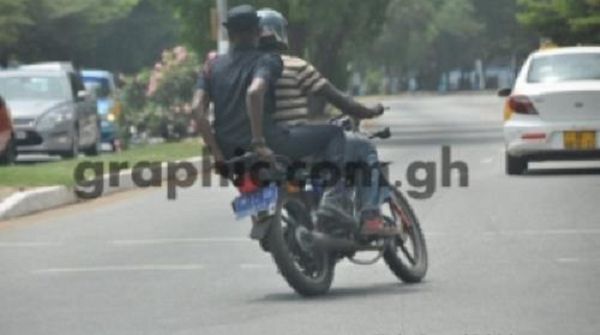
The lost okada fight
The "beauty" (sarcasm intended here) about commercial motor riders, popularly referred to as 'okada', is that most drivers do not see them until they suddenly bear down on you.
They suddenly appear, always at the blind side of drivers, accounting for the recorded fatalities.
Advertisement
Records from the Motor Traffic and Transport Department (MTTD) of the Ghana Police Service show that out of every 100 road related accidents, 30 of them are from motorbike accidents, which often leave victims with critical injuries.
That statistic is not surprising to me, in a country that, until recently, had not regarded bicycles and motorcycles as a means of transportation.
Thus, we have gone about developing massive road infrastructure without considering these means of transport or catering for them.
We have no dedicated lanes for them, so they vie with vehicles on roads and highways.
Not having been considered for long as a means of transportation, some of the riders also see themselves as not being bound by the basic rules of driving, so they constantly jump red lights.
With all these come the road conflicts and rages, injuries and deaths!
Burkina Faso, our northern neighbour, with a GDP per capita of 670.71 USD (2017), far less than Ghana's 1,641.49 USD (2017) has dedicated lanes for bicycles and motorcycles in its city, Ouagadougou.
It is riveting to watch as they all stop at the lights and start off again on their dedicated lanes in that city.
I believe that Ghana has put the cart before the horse in the matter of road infrastructure for bicycles and motorcycles; however, all is not lost with competent leaders and experts.
Late last year, the Head of Research and Programmes of the MTTD of the Ghana Police Service, Superintendent Alexander Kwaku Obeng, called for a policy intervention to solve the challenge of okada.
That was because although the country had legislated in its Road Traffic Act 663 of 2004 that the use of motorcycles for commercial purposes, ie, ‘okada’ was proscribed, Ghanaians had defied that law.
The use of it by people for the same banned purposes had become "a tug of war" between operators and the police, since the passage of the Act, he had told the Graphiconline.
The Road Traffic Regulation, 2012 (Legislative Instrument (L 2180), also passed by Parliament on July 4, 2012, among others, states that: A person shall not use or permit a motorcycle or tricycle over which that person has control to be used for commercial purposes except for courier and delivery service.
It also states that a person shall not ride on a motorcycle or tricycle as a fare-paying passenger.
Going by this, therefore, it is evident that riders of okada and those who patronise the service, have all fallen short of the law.
The okada challenge in Ghana is intriguing. First, a legislation proscribes the activity and as soon as that is done, the ban rather emboldens people to engage in that activity.
We then have parliamentarians, who passed the law and the LI, going to and from in this our motherland and not at all oblivious to the challenge of okada, paying no legislative attention to the matter or making statements to draw the attention of the executive to the challenge.
We have the police, whose focus for long has been rounding up a few of the okada drivers for photo opportunities about their 'hard work', then extorting what they can from them and just to let them go. We also have them now giving up in frustration about the matter.
Is that frustration because of the fact that most owners of okada are police men and women?
Thus, when the riders are arrested, they merely call their agents and they are let off the hook?
In all this, is the Ghanaian business woman, Akua, who, tired of being a sitting duck in traffic, resorts to the patronage of banned cycles as a means of getting from point A to B in the fastest possible way!
When I think about the okada challenge, I recall Chief Superintendent Victor Tandoh (retd), a former Commander of the Motor Transport Traffic Unit (MTTU), who in the early 2000s, began a crusade on disciplined driving, including the wearing of seatbelts by all drivers.
He was consistent and constant at it and I remember that after a period of the crusade, there was no driver behind a vehicle without it.
Mr Inspector General of Police (IGP), David Asante-Apeatu, what would be your legacy?
What would we remember you for?
Writer’s email: [email protected]



